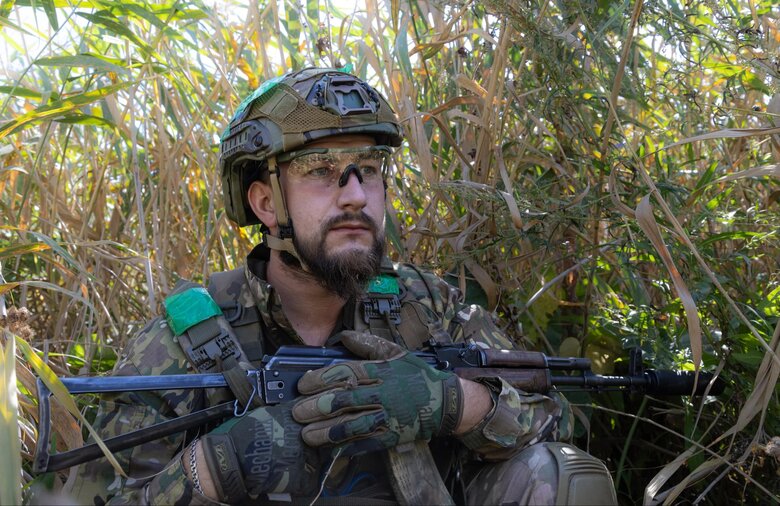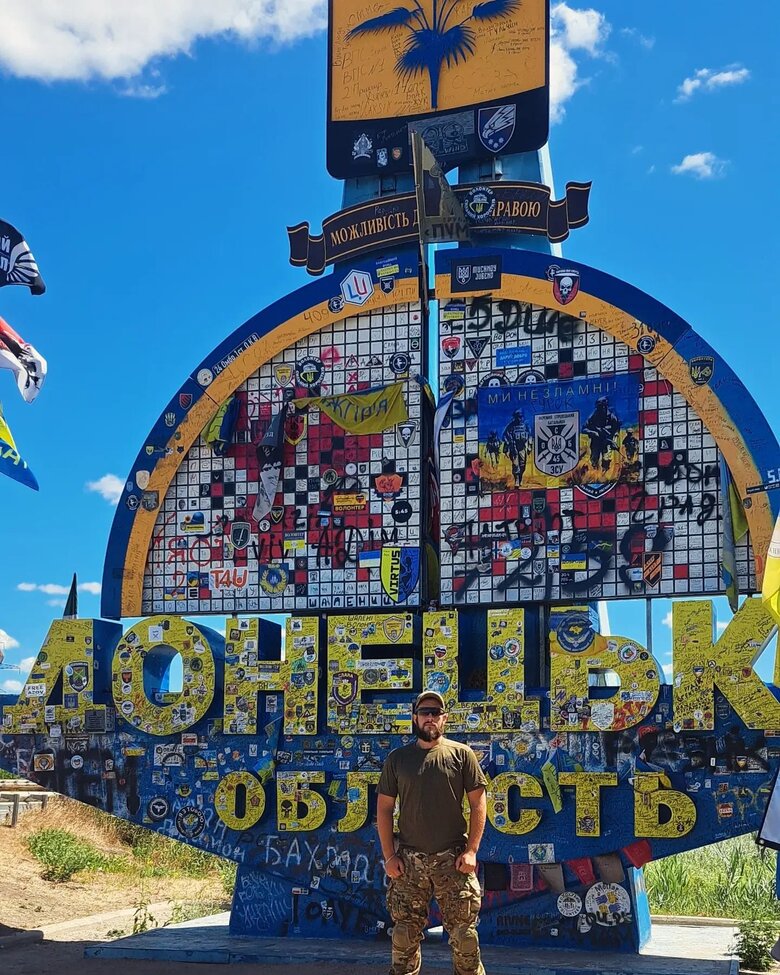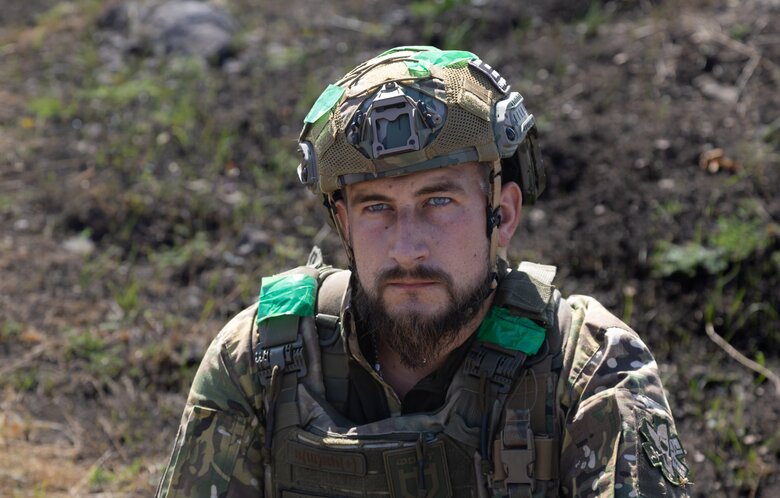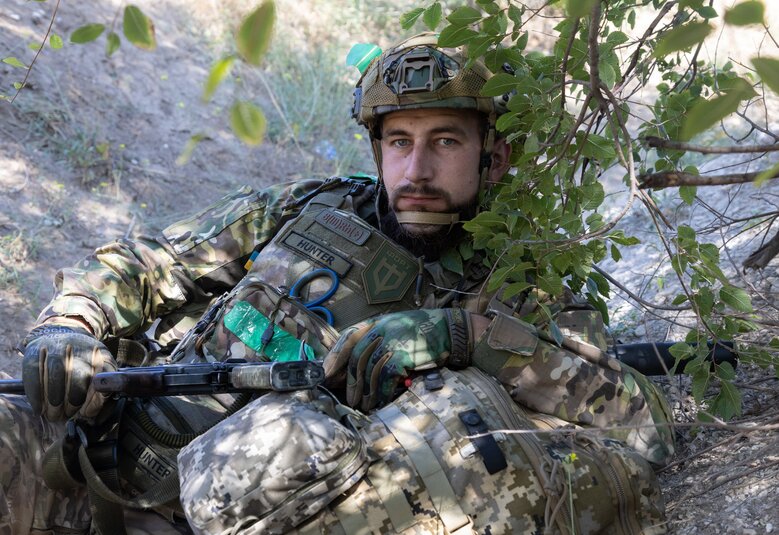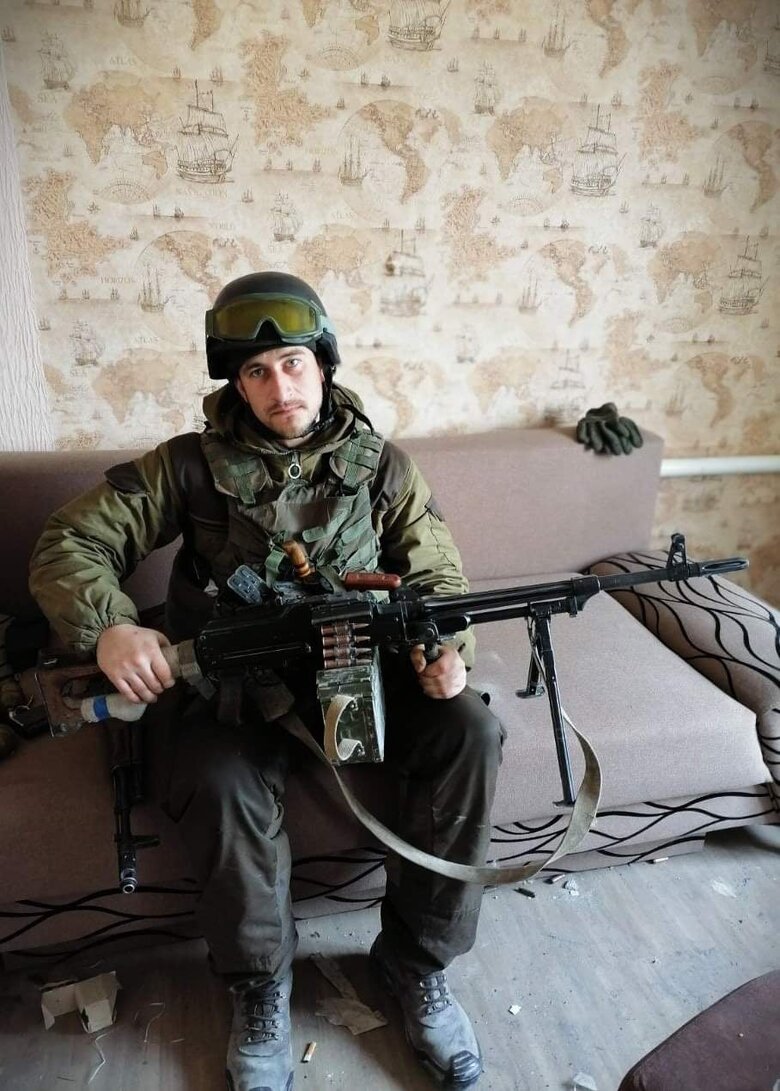Combat medic Ivan Kutsyn: "Engineers, sappers, medics and snipers are priority targets for Russians because so many lives depend on them. They are trying to destroy us"
He is one of those who had to visit the most difficult areas of the frontline. That’s why I don’t ask him about war fatigue, but only about what helps him to keep going. What prevents a combat medic from losing his humanity towards the enemy, because he also has to provide medical care to prisoners of war.
He, in turn, explains to me that it is imperative to talk to the seriously wounded whom you evacuate, because your attention to their condition and prompt response is the key to their survival.
In an interview with Censor.NET, Ivan Kutsyn, a combat medic with the 1st Armoured Personnel Carrier Company of the 35th Sumy Regiment of the National Guard of Ukraine, spoke about why the situation is more difficult now than it was in 2022, how difficult it is for a civilian doctor to become a combat medic, what mistakes the military makes when they are wounded, and how to save the life of a soldier who needs an immediate blood transfusion.
- Ivan, for you , like many Ukrainians, did your service begin in February 2022?
- It all started when I graduated from medical school. As soon as I received my diploma, I started collecting the documents that were required for military service. It was in 2021. By that time, I had already worked for 2.5 years at Sumy Central Clinical Hospital No. 1 in the neurological department with stroke beds and intensive care units. I specialise as a physical therapist and occupational therapist. Therefore, I was engaged in the recovery and rehabilitation of patients in this department.
- Are we talking about conscript service?
- Yes, I decided then that I needed to do my service in order to live with a clear conscience and continue working in the hospital. Since childhood, I dreamed of being a border guard, but my parents persuaded me to choose some other speciality - I chose the medical field. In 2003, I entered the Lebedynskyi Medical School named after Mykhailo Ivanovych Sytenko. I graduated in 2016 and went straight to the second year of medical university to study occupational therapy, physical therapy and sports medicine.
- But you haven 't stopped thinking about the service?
- No, these thoughts never left me. At the regional military enlistment office, when the teams were being formed, the chief medical officer of military unit 3051 offered to serve there. I liked this prospect and agreed. I served first in the 2nd Patrol Company, then signed a three-year contract and became a combat medic in an armoured personnel carrier company.
- How difficult was it to transform into a combat medic from a civilian?
-It 's not difficult. The hardest part is what is happening now. Compared to this, even 2022 was a cakewalk.
-The New York and Toretsk directions, as well as the Pokrovsk direction, are currently called the most critical. Have you felt it too? Are the Russians not slowing down their activity?
- Yes. We carry out tasks together with "Azov", we are their attached forces. I always work with my partner from "Azov", his call sign is Dante.
And you understand that the enemy will not throw just anyone against "Azov". Everything is really very intense, the situation is complicated.
I came out yesterday, and one of the guys who was replacing me, call sign Lutsyk, died at night.
- You said that compared to the current events, 2022 seemed like a cakewalk. Although, as far as I know, you had to take part in the defence of Rubizhne, we all remember what happened there. Did you also meet the Russian offensive in February 2022 in the Luhansk region? And why was it easier then than now?
- We were on a mission to protect platoon strongholds in the Luhansk region. I was at a platoon stronghold near Sievierodonetsk, near the village of Bulhakivka.
In the morning, my parents called me and told me that Russian equipment was coming to their place in Sumy region. I come from Bilopillia district, a village near the border. They heard the sound of the vehicles and that they had started shelling the "Ryzhivka" checkpoint.
I dialled the commander, told him about it, and a car came to pick us up. At 8 am, we evacuated the facility we were assigned to and began performing combat missions together with the Armed Forces. At first, we guarded armoured vehicles and tanks, then ensured the control regime in the suburbs of Rubizhne, and then we directly participated in the defence of the city. We held Rubizhne for 69 days - as long as we could.
Why was it easier? At that time, the enemy did not use Mavic or attack drones on such a large scale. At best, a few drones could be "hovering" in a day. And they didn't use drops back then.
At that time, the Russians used the LPR and DPR for reconnaissance by combat. They moved in groups of 3-4 people, their task was to identify our firing positions or observation posts. In order to launch a mortar or MLRS there.
The Russians were trying to get into positions. And if they took the fight and rolled back, it meant that they failed. If they didn't retreat, another group would join them, and in this way they would advance.
At the same time, if they managed to roll back intact or relatively unharmed, they still had to fight their own people. Because from the very first days, the Russians had "barrier detachments". If the soldiers who were sent forward failed to advance, dig in, or gain a foothold, they would be "zeroed out" by their own people, as they called it, upon their return.
The youngest soldier in the Russian army whose documents we have obtained is 21 years old.
- Was he killed or captured?
- There was no possibility of taking prisoners.
- How often did they manage to knock out our guys and gain a foothold?
- I can't speak about the others, but we were on Teplova Street, a private sector. Once we arrived there, we never moved, and we held our ground quite well. We were in the same place all the time. They couldn't knock us out.
- How did you hold on? At that time, the situation was difficult, including with ammunition.
-Due to the quick detection of the enemy. Because we had several two-storey houses in the street and observation posts on the second floor. And we worked on the enemy reasonably.
- What does this mean?
- If we saw the enemy, but he was not in our sector, and this prevented us from hitting him accurately with several shots, we would transmit the information to another observation post along the enemy's movement, so that they could take this into account and work on it. We worked when we were sure we could hit the enemy. And we did not "burn" the position for no reason, so as not to reveal ourselves.
- That is, you were not so much a medic then as a fighter fighting on an equal footing with others?
- The position of a combat medic is no different from that of an ordinary infantryman. You perform the same functions. You just have an additional medical backpack. A combat medic works directly with his personnel and provides medical care to soldiers when necessary. He also evacuates them if necessary. Everything is at the discretion of the company commander.
- What was the situation with transport back then? What did you use to get around?
- As soon as we entered this street, a civilian came out and gave us the keys to his car. In fact, it was a case truck, but it was used to transport 300s and 200s, as well as to bring in BCs and food. Because if an APC came by, the Russians "worked it out".
- Was it a local resident?
- Yes. He was evacuated when the enemy advanced. They advanced by destroying all the infrastructure, levelling everything to the ground. Because we had nowhere to consolidate to hold them.
- They use whatever is at hand.
- That's for sure. At that time, they even fired at the private sector with demining missiles.
- Was the intensity of the shelling high?
- I would say that they worked as if it were their working day. Somewhere around six in the morning, their assault operations began. Although, compared to the current ones, it was not an assault, but something like "accidentally walking in". The shelling stopped in the afternoon, and when it resumed, it lasted until about six in the evening. And then there was a break until the morning and relative silence.
- And what about now? Is everything more intense and the fighting much harder?
- Now I am performing tasks at the casevac, in the areas we have discussed. Before that, I was working at the triage point in Serebryanskyi Forest. This is a medical centre that provided primary medical care to the wounded.
At the moment, there is no triage point at our positions, we go to evacuation points near our positions or observation posts, where soldiers are evacuated depending on the nature of their injuries, i.e. "red", "yellow", "green". "Green" means when they have suffered barotrauma, in other words, contusions. These fighters are waiting for rotation or for food deliveries, which are made every evening. If it is necessary to take a person to hospital immediately, because it is about shrapnel, bullet and other wounds, as well as massive bleeding that is difficult to stop, then we immediately go and take the wounded.
- Are they taken out - taken to some more or less safe place or where do you pick them up from?
- There are no safe places there. The artillery works at a distance of up to 15 kilometres. And we are 700-900 metres away from the enemy.
- Do you ever find yourself unable to drive and have to walk to pick up the wounded?
- Thank God, it hasn't happened yet, because we work in the morning. Either early in the morning or late at night. This is not very safe either. I have already told you that my colleague came under mortar fire while evacuating a wounded man. A 120mm mine hit him and he died on the spot.
- Did you come under fire when you were transporting the wounded?
- It happened that when we were already loaded and leaving, they made a few target practice shots. But since they were about 70-100 metres away and we were covered by the landing, it saved us. Although shrapnel was falling near us, it was not in the same amount as it could have been if it hadn't been that landing.
There is constant shelling there. When, for example, you pick up the dead, you use a night vision device or a flashlight. And as soon as they see a car approaching, they immediately start aiming and working out.
- Are there any marks on the car that they are medics?
- We don't have any, but even if we did, it wouldn't help. Engineers, sappers, medics and snipers are priority targets for the Russians because so many lives depend on them. They are trying to destroy us.
When we arrive at the evacuation points, we have about three minutes before they aim the mortar and the first shot is fired. We have to make it within those minutes, and then there is a chance that they won't hit us. But it depends on how lucky you are...
- Do you often get injuries to the face and head? Oral and maxillofacial surgeons told me that in this war , these are quite common combat injuries.
- When we were leaving the Serebryanskyi forest, the enemy hit my comrade in the crosshairs of an assault rifle. The bullet scattered and cut his cheeks and ears. Thank God, his eyes remained intact. Only a few metal particles got under his skin.
There was also a direct hit to the head from a "Vasylka-83" mortar. Unfortunately, this fighter died on the spot.
There were also massive injuries that required amputation. Once we were taking guys from the neighbouring 53rd Brigade when a mortar was firing at us. One of them had virtually no forearm, and the other had a bad ankle. But we took them out and the men survived.
- When you transport such heavy patients, do you talk to them? Or is it better to remain silent in such cases?
- You have to talk. If you make eye contact with a wounded person, you understand how their condition changes. When his speech is impaired or slows down, it means that he is starting to lose consciousness. You also need to control the tourniquets that have been applied. If necessary, re-apply the tourniquet or, in case of a light injury, perform a conversion, apply haemostatic, and seal the wound.
Usually, we have seriously wounded people, so we transfer them to a medevac.
By the way, it is very good that all "Azov" personnel are well versed in medicine. I was very impressed with their knowledge. In fact, I had a lot to learn from them.
Their command is very particular about medical training. Because it is both self-help and mutual assistance. I think it is a great merit of the command that it pays such attention to this, the classes are not held for the sake of a tick. The soldiers know how to provide assistance, how to control, what techniques can be used. For example, whether it is appropriate to use a tourniquet or a pressure bandage. It is very good when people have knowledge and know how to use it.
- I've heard many times that you can lose a limb because of an incorrectly applied tourniquet. What are the most common mistakes made by wounded soldiers?
- An incorrectly installed turnstile. And another separate problem is the Chinese turnstile. It is a turnstile in fact, but in terms of its functions, it is a thing that kills, not saves. The sling is pulled out of it or the gate valve bends or breaks, and it does not perform its functions.
- That is, it is impossible to press it down as it should be, am I right?
- The sling that is supposed to pull up has run out, but there is still some pulling to be done.
- What's going on?
- The person actually "leaks out".
- Can you no longer help when you arrive because the person has lost a lot of blood?
- Thank God, there have been no such cases, but we have seen problematic situations with turnstiles.
At the sorting point in Serebryansky Forest, we had a heater, a refrigerator for blood with red blood cells, and we performed blood transfusions.
The medevac also has it. The guy with the forearm injury I told you about was immediately given a blood transfusion, and thanks to this, he was taken to hospital.
Because when he was reloaded from armour vehicle to medevac, he started to faint.
- When you faint, what does it mean?
- Hemorrhagic shock due to massive blood loss.
- When I talked to law enforcement officers, I heard from them that bodies can be brought back from the battlefield in pieces, which makes it difficult to identify them later. Do you also have to collect bodies in this way?
- So far, this has not happened. But one of the wounded we evacuated told us that the enemy used 14 FPV drones on their dugout to knock them out. They do not spare such drones at all and can use a drone even against one infantryman. That is, not to hit a group with shrapnel, but to kill one person. So, purely theoretically, it may be that we will have to collect body fragments if there is a direct drone hit.
- Is it the massive use of drones that makes the war harder at this stage?
- Drones are now flying like flies. There can be three or four drones hovering over a position. One has flown away, and another has arrived to replace it. They are constantly monitoring everything.
- The enemy's tactics are constantly changing, as the guys tell me in interviews.
- The enemy is also learning, and is not wasting time. Before that, we were in the Pokrovsk direction - it was tough, because there were no fortifications to hold on to and there was so much talk in the media.
- Ivan, how hard is it for a combat medic to keep his morale up in the third year of a full-scale war?
- But somehow you adapt and do your job - you save the lives of the guys. Even though you are physically exhausted. You can't rest properly, because either our artillery is working near your waiting point or the enemy's artillery is firing. They can shoot directly at you if they see the position you are in, or at the position of the artillery that is standing there next to you.
- Can you recall the worst conditions in which you had to provide assistance or evacuate people?
- There was one very busy morning in 2022 when we moved out to meet the enemy near the village of Varvarivka. It seemed that these were our last hours.
- Why?
- The enemy was shooting at us for about two hours without a break - everything was flying. We had no way to get out of our 'holes' that we had dug during the night. But we came out without losses. Two of my comrades were wounded and immediately evacuated. One of them was wounded in the leg and neck, and the other had a punctured lung. He was evacuated immediately. I was on the other side of the landing, so the reconnaissance units were evacuating the neighbouring ones. Now he is fine, performing combat missions.
- Ivan, do you have any personal fears about being injured?
- I don't want to think about it. The only thing I know for sure is that I don't want to be a burden to my family. Better two hundred than three hundred.
God willing, everything will be fine.
- Talking to the guys after they were seriously injured, I realised that, firstly, their families are ready to do anything to keep them alive. Secondly, soldiers who are paralysed as a result of their injuries can get up. Yes, it is very difficult, but there are cases like this. Therefore, all is not always lost, it is worth fighting. But I sincerely wish that everything would be really good. Have you had any cases when it seemed that someone had averted disaster?
- Recently, there was a situation when shrapnel fell around me, but I remained unharmed. And in 2022, when an FPG flew over the window, I was concussed, but I survived, except for a few scratches from the glass. And in the same year, when I was leaving the yard, there was a mortar attack.
I had to go to get a battery for the radio station two streets away. I went there because they seemed to have quieted down. But as soon as I came out of the yard, an 82nd mine landed next to me. The shrapnel only pierced my skin and stuck to my thermals.
- Do you plan to return to civilian medicine after the war?
-Yes, I wrote an application to keep my job. I wanted to help people and it would be at least useful. Because after this war is over, the need for rehabilitation specialists will be enormous.
When I was working at the hospital, my first patient was with a lumbar spinal tumour. He was operated on, but the functions of his lower limbs were almost lost.
I worked with him for 1.5 months and he first started to stand on his feet again, and then walk with support, with a cane, and then without support and without a cane. That's when I realised that I hadn't spent all those years studying in vain.
- Did you have to rescue Russians during the war?
- Yes. The guys captured one of them in the Pokrovsk direction. A Russian guy named Vova (smiling). Maybe you have seen the video of Oleksandr Yarmak? This Russian rapped his song "The Heart of a Boy".
There was one more, but he was a more important figure and his injuries were not critical. So we handed him over to the relevant authorities.
- Don' t you feel like you don't want to save them?
- No, I don't have the attitude that he is an enemy and I will not provide him with medical care. If he needs it, I will provide it. And the fact that he came here in the first place is either his dementia or his insanity. If he does not understand what he is doing on the territory of another state with weapons, killing people, destroying infrastructure...
- Of course, we are distinguished from the Russians by our humanity and respect for human rights and international conventions, but in fact they came to destroy us...
- I come from the Bilopillia district. Our village is just over a kilometre from the state border. Now it is completely destroyed by the KABs. There is not a single intact house, everything is broken.
When I was a kid, Russians always came to Bilopillia before Easter and talked to the locals. We also went to them to fill our cars with petrol and gas. Back then, they, like us, spoke Surzhyk. And now they are the "great Russian people" who hate Ukrainians to the core. I don't understand why this happened. And I had such an aversion to the Russians in 2022 that I did not want to keep them alive if possible. Because what they did and are doing is something beyond the pale. You have probably watched in the news that the mother of the pilot who struck this city lives in Kharkiv.
- What they are doing is so savage that I cannot explain it to myself with any motives.
- I believe they go to war for money. I recently read that in the Moscow and Leningrad regions, when they sign a contract, they receive about two million at a time. This is how they motivate the population to join the Russian army. Although this population has many opportunities to earn money. How many oil rigs do they have in the Arctic, where they can go on shifts to earn money without risking their lives? But they are lazy and don't want to work.
- Do they think that killing is easier?
- I think so.
Tetiana Bodnia, "Censor.NET"

